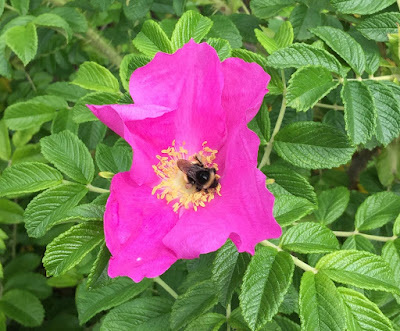Gardening as restoration
I learned long ago that encouraging folks to restore habitat by creating wildlife-sustaining gardens was an antidote to sadness about the drumbeat of loss in the natural world. That drumbeat has continued; but hope is still found in the garden.
I'm bookmarking my time in Quebec with two programs: one just before we left North Carolina at the NC Arboretum was on Pocket Meadows (with native plants). I didn't want to cancel, so we stayed so I could do the program, and we left that afternoon.
Here in Quebec, I'm doing a small program just before we return home to North Carolina, at the Heritage Center/English library in Rimouski that's part of Heritage Lower Bas St. Laurent, about Gardening for Nature. Fitting.
It restores my spirit and makes a difference, of whatever sort.
I almost wrote a piece this evening about how I feel about the current state of my country, the US. That's a call for activism, not really what I like to post on my blog.
So I'm glad to think about encouraging folks here (in a VERY short gardening season) to think about planting for bees, butterflies, birds, toads, etc.... Lawns are quite popular here, as are a lot of very ornamental shrubs which aren't wildlife sustaining. There's lots of room for restoration towards really beautiful natural habitat, as we're starting to do in our "new" landscape here.
Happily, my attention was drawn yesterday to how Rosa rugosa, a naturalized inhabitant (I hate to call it invasive) along the shores of the St. Lawrence River, and still a widely planted shrub, supports pollen-collecting bees of various sizes, as does its native counterpart Rosa palustris.
The double-flowered cultivars are largely worthless for pollen-collecting bees, but the singles (closest to the species, I suppose) are being avidly visited, both in the park and in our home garden.
I'm bookmarking my time in Quebec with two programs: one just before we left North Carolina at the NC Arboretum was on Pocket Meadows (with native plants). I didn't want to cancel, so we stayed so I could do the program, and we left that afternoon.
Here in Quebec, I'm doing a small program just before we return home to North Carolina, at the Heritage Center/English library in Rimouski that's part of Heritage Lower Bas St. Laurent, about Gardening for Nature. Fitting.
It restores my spirit and makes a difference, of whatever sort.
 |
| Rosa rugosa naturalized in Parc National du Bic |
So I'm glad to think about encouraging folks here (in a VERY short gardening season) to think about planting for bees, butterflies, birds, toads, etc.... Lawns are quite popular here, as are a lot of very ornamental shrubs which aren't wildlife sustaining. There's lots of room for restoration towards really beautiful natural habitat, as we're starting to do in our "new" landscape here.
Happily, my attention was drawn yesterday to how Rosa rugosa, a naturalized inhabitant (I hate to call it invasive) along the shores of the St. Lawrence River, and still a widely planted shrub, supports pollen-collecting bees of various sizes, as does its native counterpart Rosa palustris.
 |
| Bumblebee on Rosa rugosa |
 | ||||||||||||
| Small bee of some sort on Rosa rugosa |
Comments
Post a Comment
I enjoy hearing from fellow nature lovers and gardeners. Let me know your thoughts.